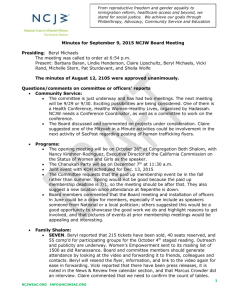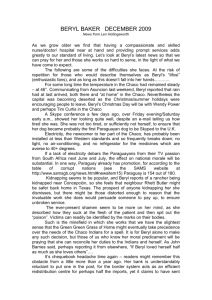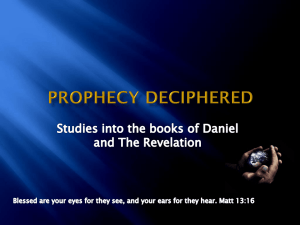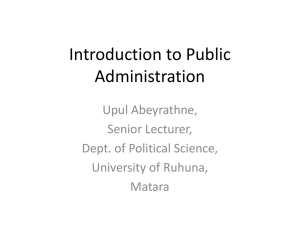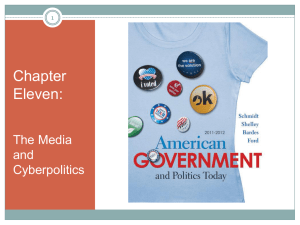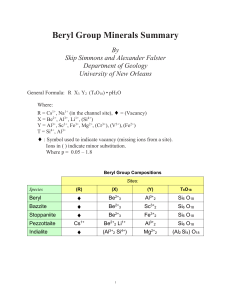Machiavelli - Radin Presentation - Slides
advertisement
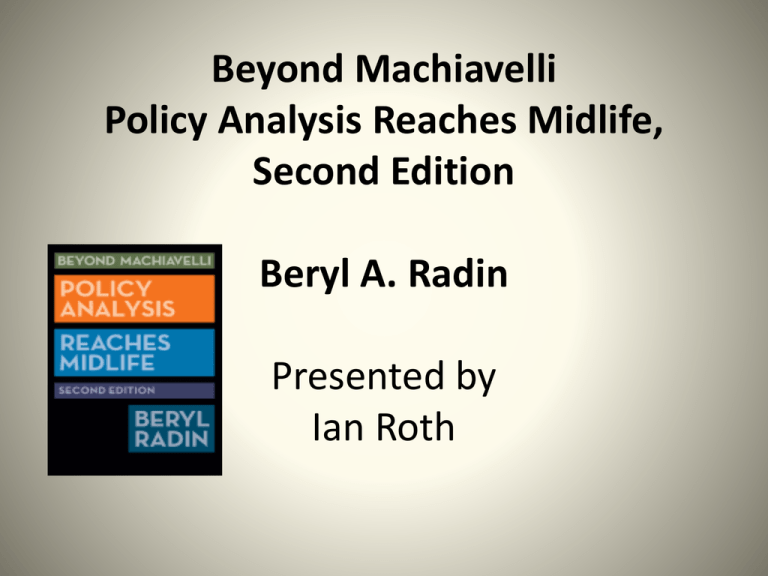
Beyond Machiavelli Policy Analysis Reaches Midlife, Second Edition Beryl A. Radin Presented by Ian Roth Agenda • • • • • Overview & Key Concepts Biography John Nelson, Rita Stone & Veronica Lopez 9 Policy Analysis Organizations Politics, Methodologies & Techniques, Availability of Information, Shifts in Role • Has Policy Analysis Reached Mid-Life? Overview “After more than fifty years, the policy analysis field has taken its place in the contemporary world of decision making. But it is also clear that the original view of policy analysis as a process of advising a prince or ruler – harking back to Machiavelli – does not capture the complexity of the field today.” Key Concepts: – Analyst/Client Relationship – Dissemination of Policy Analysis – Policy Analysis has radically changed & is continually evolving. Biography: Beryl A. Radin, “Pracademic” • Teaches at Georgetown University in Washington, DC. • An elected member of National Academy of Public Administration • Managing Editor of the Journal of Public Administration Research and Theory from 2000 to 2005. • Editor of the Georgetown University Press book series, Public Management and Change. • Special Advisor to the Assistant Secretary for Management and Budget of the US Department of Health and Human Services • Past president of the Association of Public Policy Analysis and Management • Active in the American Political Science Association and the Public Management Research Association • John Gaus award from the American Political Science Association • H. George Frederickson Award for Lifetime Achievement • Donald Stone Award given by ASPA’s Intergovt. Management • Senior Fulbright lecturer in India • Teaching and research in Hong Kong, Israel, Azerbaijan & Australia John Nelson - 1960s (Fictional) • Economist – Stanford PhD 1959 • • • • • • Cost Benefit Analysis for procurement of Defense Weapons Systems Recruited by RAND Corporation for DoD project Joined Feds in DoD’s Planning, Programming & Budgeting System (PPBS) Moved to Dept. of Health, Education & Welfare (HEW) with Alice Rivlin “Legislative proposals were spun out almost daily” Analysis – opportunities & costs of programs for elderly, children & women • • • • Analytically irrational behavior vs. highly rational behavior Returned to California to become a consultant to DoD Military base closings up until 2000 Retirement Rita Stone - 1990s (Fictional) • Child Care/Head Start – Duke University 1989 Undergrad • 2 Year internship with Children’s Defense Fund (CDF) • Graduate Studies at the University of Chicago • Internship (in-between) with Assistant Secretary for Planning and Evaluation (ASPE) at Department of Health & Human Services (HHS) • Presidential Management Intern (PMI) with Office of the Assistant Secretary for Management and Budget (ASMB) • Joined ASMB as permanent staff • Career in Office of Human Development Services in Child Care issues Veronica Lopez - 2010s (Fictional) • Grew up in Southern Texas, bilingual • • • • • • • • Undergrad as Pre-med Fellowship to Medical School Specialized in infectious diseases involving children After 2 years practice, back for a masters in Public Health – Epidemiology Joined CDC in Atlanta, GA specializing in Pediatric Infectious Diseases Involved with multiple data sources globally Joined Pan American Health Organization (PAHO) Joined Bill & Melinda Gates Fdn. as Dir. of Latin American Health Programs Policy Analysis Organizations • AARP Public Policy Institute: Policy analysis linked to lobbying & membership • Office of the Assistant Secretary for Planning & Evaluation (ASPE) in the Department of Health & Human Services: A classic policy analysis shop that changed over time • California Legislative Analyst’s Office: Analysis in a changing political environment • Center on Budget & Policy Priorities: Analysis that combines rigor with a point of view • State Fiscal Analysis Initiative Network: Balancing advocacy & analysis in the federal system Policy Analysis Organizations • Century Foundation: Research committed to solutions & action • Congressional Research Service of the Library of Congress: Analysis linked to the intricacies of the legislative process • Danish National Centre for Social Research: Balancing research & advising • Heritage Foundation: Linking research, marketing & Ideology Policy Analysis organizations are no longer just in the federal government; they come in many shapes & sizes. What Else? • Politics & Analysis – Decision maker vs. advisor • Methodologies & Techniques – Changes over time • Availability of Information – Simple to complex • Shifts in Role – Program proposal to cutbacks Politics & Analysis • Tension between role of decision maker vs. advisor • Three branches of government – easier to kill a policy than to make one. • Electoral process puts political pressure on policy analysis. • Partisanship does the same – California LAOs & the Congressional Research Service • Interest groups create politics • Coalition building is a necessity for decisions to be made; analysts are asked to reframe issues • Policy analysis impact shifted to the margins of decisions • Tensions between politics and analysis do and will exist. Methodologies & Techniques • John Nelson – produced reports, evaluations and recommendations. Measurement. • Rita Stone – Short 3-page analyses, briefings, talking points; meetings; limited reading & writing. Description. • Veronica Lopez – reverse analysis: knowing what action was needed, what did she need to know to make a recommendation; data sets did not work w/her populations; non-traditional. Judgment. Availability of Information • • • • • • • Simple to complex Federal sources Special interest generated Source of information Timeliness Information overload Future of information OUR FACTS ABSOLUTE FACTS THEIR FACTS BARE FACTS NEUTRAL FACTS UNDISPUTED FACTS DISPUTED FACTS UNSUBSTANTIATED FACTS Shifts in Role • From program proposal to fine tuning existing programs • Limited space for action • Specialization & networks • Analyzing cutbacks - Relationship between policy analysis and budget process Has Policy Analysis Reached Mid-Life? • An organization that practices policy analysis, and has a political agenda, would be defined as an “issue network” by Gen & Wright, and along with coalitions and interest groups “is the most relevant unit of analysis for understanding policy change (Sabatier, 1988), even more so than governmental players, because it is the coalitions within these subsystems, and their interactions with each other, that drive policy change.” (Gen & Wright, 176). • Policy analysis and the use of this powerful tool has become understood by many, and will be embraced and deployed by many more players, as we head into the future. From Beryl A. Radin “Ian -- Thanks for your note. Its interesting that you have picked up on my ambivalence about the future of the policy analysis field. While I think it has made a real contribution to decisionmaking, I'm not sure that the current environment and future developments will allow it to continue that contribution. I have semi jokingly commented that the third edition of the book may be subtitled: Policy Analysis Dies. Let's hope I am wrong! My best, Beryl Radin” THANK YOU
